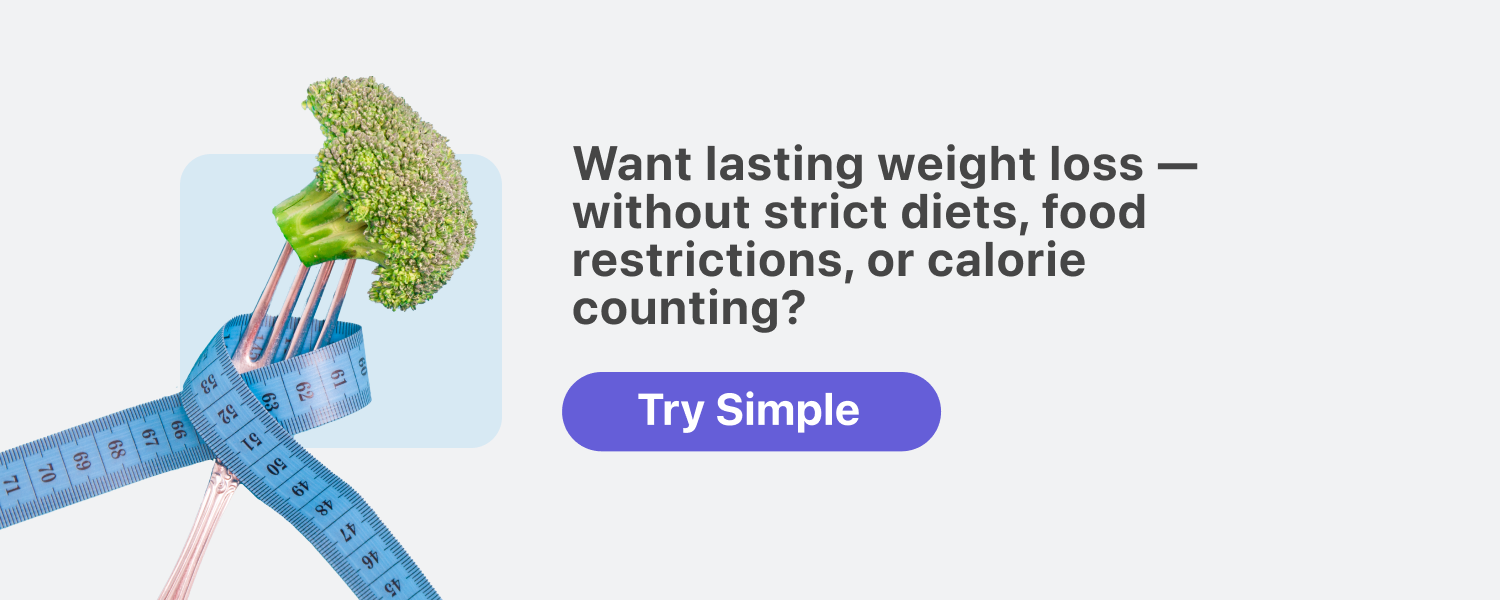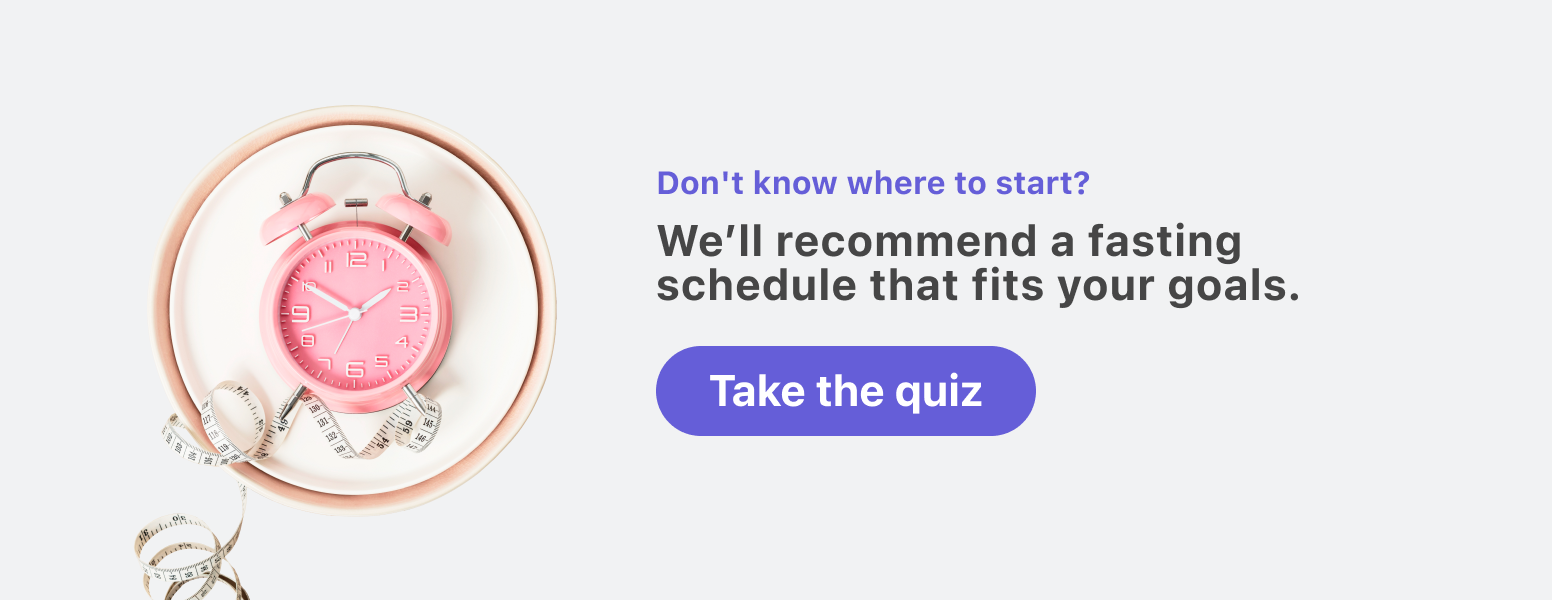A beginner’s guide on how to start losing weight

Back in the day, you could eat whatever you wanted, not think about it, and not worry about weight gain or any health effects, or at least that’s how it seemed. But today, it’s a different story.

You’re a little older, perhaps less active than you’d like, and now, eating whatever you want means your jeans aren’t as comfortable anymore. Maybe your doctors are even starting to make concerned faces when they look at your labs and throw around words like “obesity,” “heart disease,” “high blood pressure,” and “high blood sugar.”
For the first time in your life, you have to think about how to start losing weight, and you don’t know where to begin!
Weight management can be complex, but we’ve got some great weight loss tips for beginners to help you cut through the noise and find the best path for you. Whatever your reason for wanting to know how to start a weight loss journey, we can help you take those tricky first steps to reset your lifestyle and lose weight.
Goal setting for starting your weight loss journey
You’ve heard the saying, “It’s a marathon, not a sprint,” and, well, it’s certainly true of weight loss. Sustainable weight loss is slow and steady (that’s what wins the race, after all).[1] So, when you’re starting out with your weight loss goals, think long term.
Sure, getting that quick weight loss fix for your upcoming vacation or school reunion may motivate you at the start, but losing weight sustainably can help you be ready, not just for these one-off events but for life. If you stay ready, you ain’t gotta get ready, am I right? That’s the essence of sustainable weight loss — losing it once and keeping it off so you don’t have to lose it again.
Plus, when weight loss happens rapidly, it’s usually water weight or even muscle mass that’s lost. We suggest setting your sights on losing 1–2 lb per week of body fat as a safe, sustainable, and achievable goal.[2] It might not seem like much, but over the course of a year, losing 1–2 lb a week adds up to a significant amount!
Of course, results will vary from person to person, but just for a ballpark idea — imagine losing 50 lb (the weight of an average second grader, FYI) between now and this time next year. How would it feel to achieve that?
Dieting isn’t the best weight loss plan for beginners
“Dieting” is the weight loss plan of yesterday. Fad diets can be daunting with the thought of everything you need to give up, and that’s a big part of what makes them unsustainable.[3]
As we mentioned before, healthy, sustainable weight loss is a long game. Ideally, the best way to eat to lose weight is the way you can most easily adapt to your life, schedule, and preferences because that’s what you’re most likely to stick to.[2] Some find intermittent fasting to be exactly that, and that makes it the best choice for them when starting their weight loss journey.
That said, intermittent fasting isn’t for everyone. We recommend you avoid fasting if you fall under any of these categories:
- you’re pregnant, breastfeeding, or trying to conceive
- you have a body mass index (BMI) < 18.5
- you have (or are at risk of having) an eating disorder or have a history of one
- you have a medical condition
- you take prescription medications
- you’re under 18 years old, or are 80 years old or more
- you’re extremely active
If you do fall under one of these categories yet still want to explore intermittent fasting, talk to your doctor about whether it could be a safe option for you.

Extreme diet changes are unsustainable
Extreme diet changes usually involve cutting whole food groups out of your diet. They’re tough to maintain and can be risky. Often, fad diets advise you to go “low fat,” “cut carbs,” and/ or “go high protein,” but our bodies need all of the macronutrients (protein, carbohydrates, and fats) eaten in a healthy balance to work at their best.
- Protein has many crucial jobs in your body, including pH and fluid balance, transporting nutrients, and both building and repairing your muscles, organs, joints, and bones.[4] But there can be too much of a good thing when it comes to protein.
- Carbohydrates are your body’s favorite source of energy.[5] If we eat too many carbohydrates, they get stored as fat to be converted into energy later.
- Fat is also crucial to how your body functions.[6] It helps us absorb fat-soluble vitamins A, D, E, and K, is important for cell formation, and must come from the food we eat because our bodies cannot make them.
This barely scratches the surface of all the jobs macronutrients perform in our bodies, but you get the point — each macronutrient is essential to keep us functioning and feeling good. Any diet that recommends cutting one of them out is putting your health at risk.
You can’t count calories forever
It is possible to lose weight by counting calories. Many people are successful with it, but it can get really old really fast, and it’s hard to maintain.
Let’s skip that step and get started straight out of the blocks with a no-calorie-counting-required method of weight loss: intermittent fasting. It tends to be easier because you only have to control two things — when you start and when you stop eating. You’ll naturally eat fewer calories because there is less time to do so, and that is what kick-starts weight loss.
You won’t know if it’ll work for you unless you try! So, if intermittent fasting for beginners sounds like something you might be into, take our Simple quiz to get started. We’ll recommend a fasting schedule that fits your goals, needs, and lifestyle, and you’ll find tons of support in the Simple app to help you succeed from the start.
First steps to losing weight for newbies

So, what are some tips for a beginner wanting to lose some weight? We’ve got a few good ones to get you started and carry you through to your happy and healthy weight.
Introduce movement
Ever heard the saying “use it or lose it”? It’s a good rule of thumb for maintaining wellness and function in our bodies. When we don’t move, we lose muscle mass, flexibility, stamina, and stability. Movement also helps give you energy, helps with mental clarity, and can improve your sleep.
Regular movement gives you all that and the extra calorie burn that helps you burn fat and lose weight. Guidelines recommend aiming for 30 minutes of gentle movement a day;[7] this can include walking or even a gentle stroll in the neighborhood. What you love is what you’ll stick to.
Whatever your movement of choice, start small and build up. Find ways to add movement to your everyday tasks, like parking a little further away from work or taking the stairs. The more you move, the easier it’ll become, and the more you’ll want to do it.
Try mindfulness
Ever open a bag of Oreos, planning to only eat one … then you blink, and the whole package is gone? We’ve all been there. Introducing mindfulness to your eating habits can help prevent that from happening.[8]
Being mindful about what you eat doesn’t mean you’re counting every calorie or measuring your food. It just means you’re aware of what you’re putting in your mouth and why.
Emotions, boredom, and stress can all affect what and how much you eat. Learning what your eating triggers are — especially outside of hunger — can be huge in moving the scale.
To eat more mindfully:
- Don’t eat while watching TV, scrolling your phone, or working at your desk.
- Take an intentional break for meals, away from distractions.
- Savor your food. Notice taste, textures, and smells.
- Catch up with family and friends over a meal. Connecting with others helps you slow down.
- Remember, foods aren’t “good” or “bad.” There’s no need for a “cheat” day on a diet when it includes all food groups, and there’s room for every food you love in a balanced diet. (Yes, even cheesecake!)
Plan and prepare your meals in advance
Planning and preparing meals is a great first step to losing weight. Knowing what you’re going to eat ahead of time can prevent over-eating and just grabbing any old thing because it’s there and you’re hungry. It can also help you get more nutrition and variety into your meals.
The key to how to eat to lose weight is to balance your meals. That means including fiber, lean protein, healthy fats, calcium-rich foods, and quality carbohydrates more often than not. We’ll chat a bit more about this later.
Drink plenty of water
Most people don’t drink anywhere near enough water. It’s more than a thirst quencher — over half of our bodies are made of water. Water helps maintain joint and brain health, regulates temperature and electrolyte levels, and helps remove waste products from your body.[9]
How much water you need in a day depends on your gender, age, weight, environment, and activity, but on average, we need 2–3 liters per day.[10]
Getting that much water can be difficult if you’re not used to it. Start small by gradually increasing the amount of water you currently drink. If you’re fasting, you can boost your hydration by knowing what you can drink while fasting without breaking your fast.

Focus on healthy additions
It may seem a little odd to think about what to add to your plate instead of what to take away when you’re starting a weight loss journey but trust us. This method works and is a lot more fun!
Instead of cutting out foods or food groups, add foods that boost your health, fill you up, and control your hunger and cravings.
Add fibrous, vitamin-rich foods like fruits and veggies. Add whole grains and starchy vegetables. Add healthy fats like nuts, avocado, fatty fish, and flax seeds. Add lean proteins from a variety of sources, including plant-based ones.
Switch to healthier snacks
If you’re eating balanced meals, you’ll feel fuller and stay satisfied for longer. If you’re fasting, you’ve got a shorter window to fit those meals into. As a result, you may not have time for snacks, but if you do, balance your snacks like you balance your meals and include protein, fiber, and healthy fats. Think apples and peanut butter, berries in Greek yogurt sprinkled with chia seeds, or veggie sticks with hummus. And again, just like your meals — plan ahead and keep your healthy snack options easy to reach and ready to go.
Get enough sleep
Before diet, exercise, or anything else that usually goes in the weight loss basket, looking at your quality and quantity of sleep is where to start with losing weight. Sleep affects your energy levels, how you metabolize food for energy, how your muscles recover, how your hunger and fullness hormones are regulated,[11] and so much more!
Because of sleep’s impact on hunger and fullness hormones, when you’re lacking sleep, you’re not only more likely to eat more but to eat things that aren’t as health promoting.
Shoot for 7–8 hours a night, and think cool, dark, and quiet to set the best environment for long, restful sleep. If you’re having trouble with your sleep, we advise you to seek input from your healthcare provider, too.
Consult a professional
Whatever your motivation for losing weight — whether you want to better manage a health condition, feel more confident, have more energy, be more mobile, or anything else — working with a professional can help you think through how to get started with losing weight, and pinpoint the best way to reach your goals. Here are some folks you may want to have on your team.
- Your doctor. Your doctor will help you determine any medical conditions or medications you need to work around. They can review lab work and make sure you’re in a good place to get moving. Your doctor can also make sure you’ve got the green light to try intermittent fasting should you need it.
- Registered Dietitian (RD). An RD will help you take all the information you learned from your doctor and tailor a plan to meet your needs and goals. They can help answer any questions you may have, and together, you can do some diet and nutrition myth-busting so you feel confident in your nutrition knowledge. Dietitians can also provide accountability to keep you on track for your goals — as can the Simple app! Take our Simple quiz, set up your free account, and then use our food, hydration, movement, and weight trackers to record your progress and stay on track with the habits that matter to you.
- Personal trainer or physical therapist. If you have any physical challenges that may hinder your physical activity goals, working with a personal trainer — who can show you ways to work with or around them — or a physical therapist — who can help you safely heal and get stronger — could be key.
- Therapist. For some, the barrier to weight loss is mental and emotional, and these can be tricky to break down. If this resonates with you, working with a therapist could be a real help.
You’ve now met your goal-crushing team! Along with us here at Simple, you can work with professionals like these to cover your bases when starting to lose weight.
Intermittent fasting for newbies

Intermittent fasting can be an easier way to start losing weight for beginners. With this approach, you can make smaller changes to when you eat instead of restricting what you eat.
Although technically you can eat whatever you want on a fasting schedule, for best results, choose health-promoting foods like fruits, vegetables, whole grains, lean proteins, calcium-rich foods, and healthy fats. Read our guide on what to eat during intermittent fasting for more information.
You don’t need to track your calories, but if you are interested in how many to shoot for during your eating window, try our calorie calculator, and you’ll be all set!
We recommend you start light with a 12:12 intermittent fasting schedule, which is when you fast for a 12-hour window and eat during a 12-hour window. This can look like fasting from 8 PM to 8 AM, then eating from 8 AM to 8 PM. It’s an easy schedule to start with because all you need to do is extend your usual overnight fast just a little further back into the evening.
Of course, this 12-hour block can be adjusted to whatever works for your schedule. If you’re feeling good, start working your way up to a 16:8 schedule (i.e., fasting for 16 hours, then eating during an 8-hour window). We don’t recommend fasting for any longer than 16 hours, as there is a limited amount of evidence to show any additional benefits, and this could put you more at risk of developing nutrient deficiencies.
As you go, listen to your body and pay attention to any signals it gives you. If you notice things feel a little off, or it seems like intermittent fasting isn’t working, check in with yourself. Are you experiencing any intermittent fasting side effects? Are any intermittent fasting mistakes creeping in? If you notice side effects aren’t clearing and/or you’re still stuck on a plateau after making some adjustments to your routine and habits, it may be time to check in with your doctor.
Where the hardest place to lose fat is varies from person to person, but the most common area is the belly. Belly fat is more visceral (deep and wrapped around your internal organs) and is involved in hormone production and processes.[12] Research suggests that intermittent fasting combined with energy restriction can be a useful method to successfully lose visceral fat.[13]
While there aren’t any foods that directly burn fat, there are foods that help blood sugar control, satiety, and metabolism. Those foods are high in fiber (fruits and vegetables), protein (chicken, tofu, eggs, pulses including chickpeas), or healthy fats (olive oil, unsalted nuts, and avocado), and prevent excess insulin response — and subsequent fat storage — by causing blood sugar to rise more slowly.[14]
One of the main signs of fat loss vs. weight loss is a change in your body composition. Even if the scale doesn’t budge, you’ll drop clothing sizes and see more muscle definition when you look in the mirror. You may also sleep better and have more energy.

- Ashtary-Larky D, Ghanavati M, Lamuchi-Deli N, Payami SA, Alavi-Rad S, Boustaninejad M, et al. Rapid Weight Loss vs. Slow Weight Loss: Which is More Effective on Body Composition and Metabolic Risk Factors? Int J Endocrinol Metab. 2017 Jul;15(3):e13249.
- Koliaki C, Spinos T, Spinou Μ, Brinia ΜE, Mitsopoulou D, Katsilambros N. Defining the Optimal Dietary Approach for Safe, Effective and Sustainable Weight Loss in Overweight and Obese Adults. Healthcare (Basel) [Internet]. 2018 Jun 28;6(3).
- Tahreem A, Rakha A, Rabail R, Nazir A, Socol CT, Maerescu CM, et al. Fad Diets: Facts and Fiction. Front Nutr. 2022 Jul 5;9:960922.
- LaPelusa A, Kaushik R. Physiology, Proteins. StatPearls Publishing; 2022.
- Holesh JE, Aslam S, Martin A. Physiology, Carbohydrates. In: StatPearls. Treasure Island (FL): StatPearls Publishing; 2023.
- Liu AG, Ford NA, Hu FB, Zelman KM, Mozaffarian D, Kris-Etherton PM. A healthy approach to dietary fats: understanding the science and taking action to reduce consumer confusion. Nutr J. 2017 Aug 30;16(1):53.
- Physical activity guidelines for Americans. Okla Nurse. 2008;53(4):25.
- Olson KL, Emery CF. Mindfulness and weight loss: a systematic review. Psychosom Med. 2015 Jan;77(1):59–67.
- Popkin BM, D’Anci KE, Rosenberg IH. Water, hydration, and health. Nutr Rev. 2010 Aug;68(8):439–58.
- Taylor K, Jones EB. Adult Dehydration. StatPearls Publishing; 2022.
- Lin J, Jiang Y, Wang G, Meng M, Zhu Q, Mei H, et al. Associations of short sleep duration with appetite-regulating hormones and adipokines: A systematic review and meta-analysis. Obes Rev. 2020 Nov;21(11):e13051.
- Shuster A, Patlas M, Pinthus JH, Mourtzakis M. The clinical importance of visceral adiposity: a critical review of methods for visceral adipose tissue analysis. Br J Radiol. 2012 Jan;85(1009):1–10.
- Sun JC, Tan ZT, He CJ, Hu HL, Zhai CL, Qian G. Time-restricted eating with calorie restriction on weight loss and cardiometabolic risk: a systematic review and meta-analysis. Eur J Clin Nutr [Internet]. 2023 Jul 24.
- Ludwig DS, Ebbeling CB. The Carbohydrate-Insulin Model of Obesity: Beyond “Calories In, Calories Out.” JAMA Intern Med. 2018 Aug 1;178(8):1098–103.
